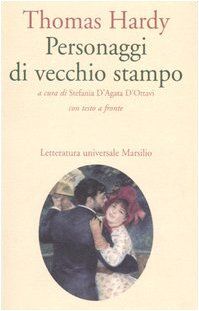Need help? Click here 1-866-467-4946 U.S. TOLL FREE We ship worldwide
Personaggi di vecchio stampo/A Few Crusted Characters - Thomas Hardy
Product Description
Personaggi di vecchio stampo/A Few Crusted Characters - Thomas Hardy
Letteratura universale Marsilio - Elsinore - Italian Parallel Text
Edited by Stefania D'Agata D'Ottavi
Paperback, 216 pages
Each volume in this series presents a classic of English literature with a new Italian translation on the facing page, as well as an extensive introduction, information about the text and the author, in-depth annotations, and a complete bibliography, all in Italian.
The phrase `life's little ironies' is now proverbial, but it was coined by Hardy as the title for this, his third volume of short stories. While the tales and sketches reflect many of the strengths and themes of the great novels, they are powerful works in their own right. Unified by his quintessential irony, strong visual sense, and engaging characters, they deal with the tragic and the humorous, the metaphysical and the magical. The collection displays the whole range of Hardy's art as a writer of fiction, from fantasy to uncompromising realism, and from the loving re-creation of a vanished rural world to the repressions of fin-de-siecle bourgeois life.
-
Ciascun volume di questa collana si presenta come una monografia completa composta da un saggio introduttivo, una nuova traduzione con testo a fronte, note informative sull'autore e sull'opera, un commento essenziale, una ricca bibliografia.
La nota distintiva di questo piccolo capolavoro - insolita nel cupo tragico panorama dei grandi romanzi di Hardy - è quella della leggerezza. Inserite in una più ampia raccolta che si intitola Piccole ironie della vita, queste storie - raccontate a turno da un gruppo di viaggiatori che si spostano in carrozza per un breve tragitto - narrano la vita quotidiana di una comunità contadina o paesana, con le sue coincidenze, gli inganni e gli scherzi del destino: storie di paure e di beffe, di corteggiamenti e matrimoni, di eredità, di balli, di nascita e morte; storie in cui verità e bugie, grandi drammi e piccole furbizie, superstizioni e proverbi si mescolano in un ritmo serrato e in un dialogo ricchissimo di registri e idiomi; sullo sfondo, la campagna del Wessex, la regione semi-immaginaria, mitica e reale al tempo stesso, che anima gran parte delle narrazioni di Hardy. Un mondo antico e corale, sprofondato nel passato e nei tempi lunghi dei cicli naturali, che pure proietta la sua ombra sul presente, e sulle contraddizioni della modernità. Ultimo a salire sulla carrozza, e ansioso ascoltatore dei racconti, è infatti John Lackland, novello parodico Giovanni-Senza-Terra, emigrante di ritorno da un sogno fallito di successo e di felicità, che cerca ora di rintracciare, nelle storie dei suoi antichi compaesani, il filo di una origine e di un luogo mitizzato e perduto. Ma sia il viaggio che il racconto, vani tentativi di colmare una distanza, si arrestano al cimitero del paese, e sulle lapidi che altro non sono, ormai, che nomi. In queste vittoriane "mille e una notte" in miniatura la narrazione non ha allontanato la morte, ma la vita.
Personaggi di vecchio stampo/A Few Crusted Characters - Thomas Hardy
Thomas Hardy was born on June 2, 1840, in Higher Bockhampton, England. The eldest child of Thomas and Jemima, Hardy studied Latin, French, and architecture in school. He also became an avid reader. Upon graduation, Hardy traveled to London to work as an architect's assistant under the guidance of Arthur Bloomfield. He also began writing poetry. How I Built Myself a House, Hardy's first professional article, was published in 1865. Two years later, while still working in the architecture field, Hardy wrote the unpublished novel The Poor Man and the Lady. During the next five years, Hardy penned Desperate Remedies, Under the Greenwood Tree, and A Pair of Blue Eyes. In 1873, Hardy decided it was time to relinquish his architecture career and concentrate on writing full-time. In September 1874, his first book as a full-time author, Far from the Madding Crowd, appeared serially. After publishing more than two dozen novels, one of the last being Tess of the d'Urbervilles, Hardy returned to writing poetry--his first love. Hardy's volumes of poetry include Poems of the Past and Present, The Dynasts: Part One, Two, and Three, Time's Laughingstocks, and The Famous Tragedy of the Queen of Cornwall. From 1833 until his death, Hardy lived in Dorchester, England. His house, Max Gate, was designed by Hardy, who also supervised its construction. Hardy died on January 11, 1928. His ashes are buried in Poet's Corner at Westminster Abbey.
-
Language
Italian
-
Level
Intermediate
-
Book Binding
Paperback
-
Book Dimensions
18.4 x 12.8 x 2.4 cm
-
Book Format
Unabridged
-
Book Genre
Classics
-
Book ISBN
9788831788786
-
Book Page Count
216
-
Book Publication Date
2006
-
Book Publisher
Marsilio Editori
-
Delivery Estimate
Please allow from 10 to 21 days for this item to be delivered, as it ships from Europe.














